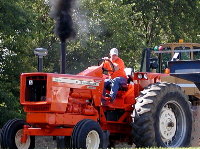I don't want to be the genius guy who calculates the bumble bee can't fly, but...
As I read their data, the piston expanded .008" from room temp to 300 degrees.
Considering 300 degrees the operating temp of the piston skirt. Seems reasonable.
Missing is the new diameter (expansion) of the sleeve when up to operating temp.
What could this be? Assume the sleeve gets to 200 degrees, the answer is about
.0033 expansion. (6ppm/deg.F, 130 degree rise, 4.25" diameter).
So, .0035" (starting clearance) + .0033" sleeve expand-.008 piston expand=-.0012"
negative clearance at operating temp. Interference, the engine will melt!
Assume we want to operate with .0025" operating clearance (my guess), we should have started with .00072 piston to sleeve clearance. Now who told us that?
However, the piston mfg of these parts say .0035", I see tones of similar numbers
(the net, YouTube...) for car engines. I don't know.









 Topic Options
Topic Options

 Post Options
Post Options Thanks(0)
Thanks(0)



